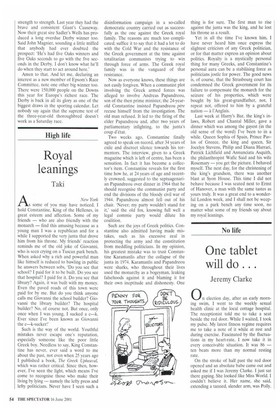Royal leanings
Taki
ANew York
some of you may have noticed, I hold Constantine, King of the Hellenes, in great esteem and affection. Some of my friends — who are also friendly with the monarch — find this amusing because as a young man I was a republican and for a while I supported the very junta that drove him from his throne. My friends' reaction reminds me of the old joke of Giovanni, who is seen crying on a Tuscan park bench. When asked why a rich and powerful man like himself is reduced to bawling in public he answers between sobs, 'Do you see that school? I paid for it to be built. Do you see that hospital? I paid for it. Do you see that library? Again, it was built with my money. Even the paved roads of this town were paid for by me. But do you think anyone calls me Giovanni the school builder? Giovanni the library builder? The hospital builder? No, of course not. But once, only once when I was young, I sucked a c—k. Ever since I've been known as Giovanni the c—k-sucker!'
Such is the way of the world. Youthful mistakes never escape one's reputation, especially someone like the poor little Greek boy. Needless to say, King Constantine has never, ever said a word to me about the past, not even when 25 years ago I published a book, The Greek Upheaval, which was rather critical. Since then, however, I've seen the light, which means I've come to recognise those who make their living by lying — namely the lefty press and lefty politicians. Never have I seen such a
disinformation campaign in a so-called democratic country carried out as successfully as the one against the Greek royal family. The reasons are much too complicated; suffice it to say that it had a lot to do with the Cold War and the resistance of the Greek government at the time against totalitarian communists trying to win through force of arms. The Greek royal family was in the vanguard of that resistance.
Now as everyone knows, these things are not easily forgiven. When a communist plot involving the Greek armed forces was alleged to involve Andreas Papandreou, son of the then prime minister, the 24-yearold Constantine insisted Papandreou pere recuse himself from the investigation. The old man refused. It led to the firing of the elder Papandreou and, after two years of parliamentary infighting, to the junta's coup d'etat.
Two weeks ago, Constantine finally agreed to speak on record, after 34 years of exile and discreet silence towards his tormentors. The interview, given to a Greek magazine which is left of centre, has been a sensation. In fact it has become a collector's item. Constantine reveals for the first time how he, at 24 years of age and recently crowned, suggested to the septuagenarian Papandreou over dinner in 1964 that he should recognise the communist party and end the divisions of the bloody civil war of 1944. Papandreou almost fell out of his chair. 'Never; my party wouldn't stand for it,' said the old fox, knowing full well a legal commie party would dilute his coalition.
Such are the joys of Greek politics. Constantine also admitted having made mistakes, such as his excessive zeal in protecting the army and the constitution from meddling politicians. In my opinion, his greatest mistake was to trust Constantine Karamanlis after the collapse of the junta in 1974. Karamanlis and Papandreou were sharks, who throughout their lives used the monarchy as a bogeyman, leaking falsehoods against it and blaming it for their own ineptitude and dishonesty. One thing is for sure. The first man to rise against the junta was the king, and he lost his throne as a result.
Yet in all the time I've known him, I have never heard him once express the slightest criticism of any Greek politician, or for that matter express an opinion about politics. Royalty is a mystically personal thing for many Greeks, and Constantine's personal aura can be a stabilising force as politicians jostle for power. The good news is, of course, that the Strasbourg court has condemned the Greek government for its failure to compensate the monarch for the seizure of his properties, which were bought by his great-grandfather, not, I repeat not, offered to him by a grateful nation — a l'Anglais.
Last week at Harry's Bar, the king's inlaws, Robert and Chantal Miller, gave a dinner which was among the gayest (in the old sense of the word) I've been to in a while. Queen Sophia of Spain, Prince Pavlos of Greece, the king and queen, Sir Jocelyn Stevens, Philip and Diana Harrari, Patrick Lichfield and Annunciata Asquith, the philanthropist Wafic Said and his wife Rosemary — you get the picture. I behaved myself. The next day, for the christening of the king's grandson, there was another blast at Syon House. This time I did not behave because I was seated next to Ernst of Hanover, a man with the same tastes as yours truly. It was a great end to a wonderful London week, and I shall not be weeping on a park bench any time soon, no matter what some of my friends say about my royal leanings.


































































 Previous page
Previous page